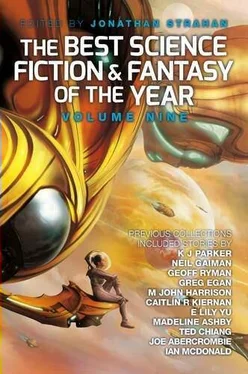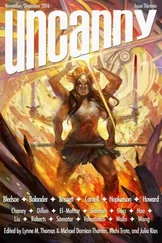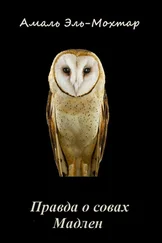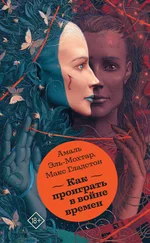Амаль Эль-Мохтар - The Truth About Owls
Здесь есть возможность читать онлайн «Амаль Эль-Мохтар - The Truth About Owls» весь текст электронной книги совершенно бесплатно (целиком полную версию без сокращений). В некоторых случаях можно слушать аудио, скачать через торрент в формате fb2 и присутствует краткое содержание. Год выпуска: 2014, Жанр: Фэнтези, на английском языке. Описание произведения, (предисловие) а так же отзывы посетителей доступны на портале библиотеки ЛибКат.
- Название:The Truth About Owls
- Автор:
- Жанр:
- Год:2014
- ISBN:нет данных
- Рейтинг книги:5 / 5. Голосов: 1
-
Избранное:Добавить в избранное
- Отзывы:
-
Ваша оценка:
- 100
- 1
- 2
- 3
- 4
- 5
The Truth About Owls: краткое содержание, описание и аннотация
Предлагаем к чтению аннотацию, описание, краткое содержание или предисловие (зависит от того, что написал сам автор книги «The Truth About Owls»). Если вы не нашли необходимую информацию о книге — напишите в комментариях, мы постараемся отыскать её.
The Truth About Owls — читать онлайн бесплатно полную книгу (весь текст) целиком
Ниже представлен текст книги, разбитый по страницам. Система сохранения места последней прочитанной страницы, позволяет с удобством читать онлайн бесплатно книгу «The Truth About Owls», без необходимости каждый раз заново искать на чём Вы остановились. Поставьте закладку, и сможете в любой момент перейти на страницу, на которой закончили чтение.
Интервал:
Закладка:
Amal El-Mohtar
The Truth About Owls
This story was first published in Kaleidoscope , edited by Alisa Krasnostein and Julia Rios (Twelfth Planet Press, 2014).
Introduction To "The Truth About Owls"
This is the story that was supposed to be about owls and ended up being, in part, about Israel's bombing of Lebanon in 2006.
This was an accident.
What happened was this: flush with love for the Scottish Owl Centre to which Tessa Kum had introduced me, I began outlining the structural idea for the story while C. S. E. Cooney was visiting me over Christmas in 2013. I told her that I wanted to tell the story of a girl who really connected with Blodeuwedd, a woman made of flowers, because of how she felt like an arbitrary assemblage of bits and pieces that someone had commanded to be girl . Originally it was going to be more about gender, more invested in the structure of revealing that "a gathering of flowers" is a florilegium is an anthology, that Blodeuwedd is an anthology herself, and wouldn't it be clever to have fragments of story coming together as a whole within an anthology about diversity ahh the cleverness can't you just taste it!
The trouble was, I wanted Anisa to be 15 in 2014, and to have had her childhood in Lebanon. And when I did the math I realized that meant she would be in Lebanon in 2006. And I panicked.
I didn't want to tell a story about war, but I felt there was something irresponsible in shying away from it, in changing Anisa's age or background in awkward ways to avoid talking about it. I tried anyway; I thought to myself, "well, in my head she's not from Beirut, where most of the damage was done — I'll have her be from Riyaq, my mother's town, because I remember it too and I have a lot of memories connected to it and it's in the Beqaa valley and mostly farmland so hey maybe they didn't get hit in the same way but I should check—"
Guess where one of Lebanon's three military air bases is. Go on, guess. I laughed a hollow laugh.
It felt at this point that the universe was sternly telling me to take the real world into account in my fantasy story about owls. So I did. It was hard, and the story isn't reflecting any direct experience I've had of war — though I was the younger Anisa's age when I lived in Lebanon, it was Beirut in the early 90s with trips into the mountains and valleys, surrounded everywhere by the evidence of recent violence without living it myself. But the story does, necessarily, draw on my memories, my fears: I was never afraid for myself or my family while we were in Lebanon, but living in Canada and seeing my father frequently travel there and back, I was often afraid he wouldn't return. I wrote consolatory poems about it, privately, as a kind of advance-practice for grief.
Consequently I struggled with whether or not it was my place to try and speak about an experience of war that is at once so close to and so far from me. I suppose my whole life I've been as between instances of war as I have been between languages — that I am a heritage-speaker of war the way Anisa's mother is a heritage-speaker of Arabic. It's difficult; like the truth about owls, it's complicated.
That's what the Arabic says, by the way. For the love of all that's wonderful don't trust Google Translate. The truth about owls is complicated . Because it is.
You can read "The Truth About Owls" or listen to it in this week's podcast; and you can read ashort interview with Alisa Krasnostein and Julia Rios, the editors of Kaleidoscope .
For Tessa Kum
Owls have eyes that match the skies they hunt through. Amber-eyed owls hunt at dawn or dusk; golden-eyed owls hunt during the day; black-eyed owls hunt at night.
No one knows why this is.
Anisa's eyes are black, and she no longer hates them. She used to wish for eyes the color of her father's, the beautiful pale green-blue that people were always startled to see in a brown face. But she likes, now, having eyes and hair of a color those same people find frightening.
Even her teachers are disconcerted, she's found — they don't try to herd her as they do the other students. She sees them casting uncertain glances towards her before ushering their group from one owl exhibit to another, following the guide. She turns to go in the opposite direction.
"Annie-sa! Annie, this way!"
She turns, teeth clenching. Mrs. Roberts, whose pale powdered face, upswept yellow hair, and bright red lips make Anisa think of Victoria sponge, is smiling encouragingly.
"My name is A-NEE-sa, actually," she replies, and feels the power twitching out from her chest and into her arms, which she crosses quickly, and her hands, which she makes into fists, digging nails into her palms. The power recedes, but she can still feel it pouring out from her eyes like a swarm of bees while Mrs. Roberts looks at her in perplexed confusion. Mrs. Roberts' eyes are a delicate, ceramic sort of blue.
Anisa watches another teacher, Ms. Grewar, lean over to murmur something into Mrs. Roberts' ear. Mrs. Roberts only looks more confused, but renews her smile uncertainly, nods, and turns back to her group. Anisa closes her eyes, takes a deep breath, and counts to ten before walking away.
Owls are predators. There are owls that would tear you apart if you gave them half a chance.
The Scottish Owl Centre is a popular destination for school trips: a short bus ride from Glasgow, an educational component, lots of opportunities for photographs to show the parents, and who doesn't like owls nowadays? Anisa has found herself staring, more than once, at owl-print bags and shirts, owl-shaped earrings and belt buckles, plush owl toys and wire statues in bright, friendly colors. She finds it all desperately strange.
Anisa remembers the first time she saw an owl. She was seven years old. She lived in Riyaq with her father and her grandparents, and that morning she had thrown a tantrum about having to feed the chickens, which she hated, because of their smell and the way they pecked at her when she went to gather their eggs, and also because of the rooster, who was fierce and sharp-spurred. She hated the chickens, she shouted, why didn't they just make them into soup.
She was given more chores to do, which she did, fumingly, stomping her feet and banging cupboard doors and sometimes crying about how unfair it was. "Are you brooding over the chickens," her father would joke, trying to get her to laugh, which only made her more furious, because she did want to laugh but she didn't want him to think she wasn't still mad, because she was.
She had calmed down by lunch, and forgotten about it by supper. But while helping her grandmother with the washing up she heard a scream from the yard. Her grandmother darted out, and Anisa followed, her hands dripping soap.
An owl — enormous, tall as a lamb, taller than any bird she had ever seen — perched in the orange tree, the rooster a tangle of blood and feathers in its talons. As Anisa stared, the owl bent its head to the rooster's throat and tore out a long strip of flesh.
When Anisa thinks about this — and she does, often, whenever her hands are wet and soapy in just the right way, fingertips on the brink of wrinkling — she remembers the guilt. She remembers listening to her grandmother cross herself and speak her words of protection against harm, warding them against death in the family, against troubled times. She remembers the fear, staring at the red and pink and green of the rooster, its broken, dangling head.
But she can't remember — though she often tries — whether she felt, for the first time, the awful electric prickle of the power in her chest, flooding out to her palms.
Читать дальшеИнтервал:
Закладка:
Похожие книги на «The Truth About Owls»
Представляем Вашему вниманию похожие книги на «The Truth About Owls» списком для выбора. Мы отобрали схожую по названию и смыслу литературу в надежде предоставить читателям больше вариантов отыскать новые, интересные, ещё непрочитанные произведения.
Обсуждение, отзывы о книге «The Truth About Owls» и просто собственные мнения читателей. Оставьте ваши комментарии, напишите, что Вы думаете о произведении, его смысле или главных героях. Укажите что конкретно понравилось, а что нет, и почему Вы так считаете.












